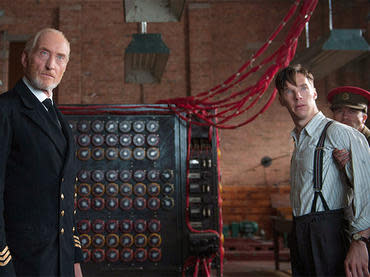The Imitation Game, film review: The breaking of a code-breaker

The Imitation Game • Directed by Morten Tyldum • www.theimitationgamemovie.com In one of his books aimed at educating aspiring screenwriters, William Goldman (writer of The Princess Bride and Butch Cassidy and the Sundance Kid) advises the following: "You must give your star everything". By which he means that the star gets the best lines, the best 'moments', and all the significant breakthroughs.
You can see this principle at work in The Imitation Game which tells the biographical story of computer scientist Alan Turing (Benedict Cumberbatch). In the movie, Turing's very smart mathematician colleagues are foils and even opponents, and while in real life they may have made significant contributions, we are not told what they are.
The movie is interesting and enjoyable but let's be honest: you've seen its like before. A tortured genius with groundbreaking ideas must get them past an obstructive establishment and alienated, balking colleagues who slowly come to award him grudging respect. Eventually, he (it's usually a he) triumphs.
The present example includes some familiar set pieces, including the obligatory 'I am Spartacus' scene. It's typical of mainstream movie-making circa 2014 that the sole female scientist, Joan Clarke (Keira Knightley), must be the smartest of the bunch, and the compassionate one who provides the hero with the clues and emotional support he most needs. I could have done without the catchphrase with which they reassure each other, but the real-life Clarke was awarded the MBE for her services in 1947. It's interesting to compare this movie with the current TV series Manhattan, which fictionalises the contemporaneous and equally secret war-stopping effort, the Manhattan Project: many of the same tropes play out.
Tragic genius
Of course, the real-life Turing really was a tragic genius, although a fact-check against Alan Turing: The Enigma by Andrew Hodges, on which the movie is based, shows that he actually had substantial establishment and colleague support for his code-cracking ideas. What the movie never shows us is his actual gayness: we see a fledgling relationship from his school days, but no such interaction as an adult. In the universe of the movie, Turing is the only homosexual we see until the end, when a statistic flashes up giving the number of similar prosecutions.
An equally large omission for the technically inquisitive is any attempt to explain how the machine he was building -- in real life the Bombe -- actually worked. Similarly hand-waved was the methodology behind the statistical calculations used to determine which decrypted information to act upon.
I suspect that most people seeing the movie will have no idea how extreme the secrecy was for many decades after the war's end. Everything to do with cryptography was regarded as a military weapon until the advent of the internet and the early-1990s crypto 'wars' forced change. That secrecy, shown in the movie, makes its entire framing device wildly implausible: there is no way even the fictional Turing would have been recounting his wartime exploits to a random Manchester detective in 1951.
In 1996, a prominent scientist acquaintance bought an Enigma machine at auction and rang up Bletchley Park to ask for information about how it worked. Even then, they wouldn't tell him. That's the rigid establishment that both the real and fictional Turing came up against -- and it killed him. The Queen got it wrong in 2013 when she issued Turing a royal pardon: it should have been a grovelling apology.


